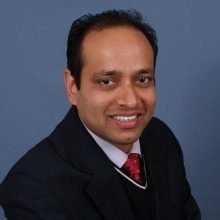
Sundar Vaidyanathan is co-Founder and Managing Partner at Karsun Solutions, an enterprise modernization federal contractor, and spoke with us briefly last year on what sequestration means for small business contractors.
Today, Vaidyanathan, who is an active member of the Industry Advisory Council (IAC) and TechAmerica, spoke with us about the next “big thing” in federal IT, STEM outreach, if it’s hard to find a trained workforce, who his mentors are, what advice he might have for those looking to jump careers or begin their own company, and much more. Vaidyanathan holds Masters degrees in Business Administration (University of Maryland, College Park) and Electrical Communication Engineering (Indian Institute of Science, Bangalore).
It’s no doubt that 2013 has been anticipated as a year of uncertainty, sequestration, and budget cuts. If you asked Vaidyanathan what he might say to anyone looking to change positions or ascend to “Founder,” he would break it down for you in three ways: environment health, having mentors, and a teaming partner.
“One piece of specific advice I would give to people who want to change careers or become entrepreneurs is not to switch careers or start a company when things are not going well,” Vaidyanathan began. “Secondly, you must seek mentors early on in your career and long before you make the decision to switch or start your own firm. Thirdly, having a great teaming partner with like-mindedness would be a boon. I feel very lucky to have teamed with my business partner, Kartik Mecheri, who shares the same values and vision for Karsun.”
For Vaidyanathan, his two of his biggest mentors are from Unisys: PV (Venkatapathi Puvvada) and Bob Bratt, both people he says he just “can’t thank enough.”
And he adds on that there is more to being a successful leader.
“Having a strong inner desire to be on your own is an important trait of an entrepreneur,” Vaidyanathan said. “You need to be lucky in landing an opportunity but at the same time your mind needs to be prepared to seize the opportunity. The ride of being an entrepreneur is something not exposable; you just have to feel it. I’m enjoying every bit of it.”
So how difficult does Vaidyanathan think it is to find a trained workforce for his contract work? He says that though his company has done well in “identifying and recruiting trained workforce across the board,” in areas like Cloud and Big Data, finding personnel with “specialized skills and experience” is still a “challenge.”
“We have established Karsun Innovation Center to create prototypes leveraging innovations to solve specific customer use cases,” Vaidyanathan said. “Karsun Innovation Center not only enables us to acquire differentiated capabilities but also serves as a training platform for enhancing skills for our workforce.
I recently became involved with the STEM Ambassador program at Thomas Jefferson High School for Science and Technology (TJHSST), which is an ideal way to develop and foster talent early on. These high school students are engaged in academic activities that are highly advanced. I’m planning to leverage and tap into those young minds as a long-term strategy.”
And this brought WashingtonExec, which is also an outlet for STEM-related news, to ask Vaidyanathan about STEM outreach engagement processes, and if it was hard to do so as a small business with limited resources.
“Prior to establishing Karsun Innovation Center, we had sponsored two mobility projects through Senior Design Program at University of Texas at Dallas,” Vaidyanathan said. “They were helpful in terms of acquiring basic capabilities on mobility without the need to hire specialized technical talent. Our long-term approach is to have an integrated strategy to leverage Karsun Innovation Center and STEM-like programs at Universities/High Schools to acquire and deliver new capabilities such as Cloud-enabled self-service (i.e. self-service for Business Intelligence) for customers on a sustained basis. “
Aside from STEM, Vaidyanathan also gave us his thoughts on what the next in-demand technology might be in the current budgetary climate. Vaidyanathan says the environment will “continue to exert pressure” on agencies to “Do More with Less.”
“The federal IT marketplace has been infused with innovations such as Cloud, Mobility, Social and Big Data,” Vaidyanathan said. “However, Cloud is clearly becoming one of the foundation blocks for achieving productivity gains while simultaneously providing the required agility. The demand for Cloud Services such as Infrastructure/Platform/Software as a Service will be in high demand in the current environment.”
But it’s not all work and no play for this company executive. Vaidyanathan’s favorite gadget is his iPhone, favorite app the DropBox, and his favorite book, “Crucial Conversations: Tools for Talking When Stakes Are High” by Kerry Patterson, Joseph Grenny, Ron McMillan, and Al Switzler.
Vaidyanathan concluded the chat with a Charles Darwin quote, one that quite aptly surmises his own advices in this interview.
“It is not the strongest of the species that survives, nor the most intelligent that survives. It is the one that is the most adaptable to change.”


